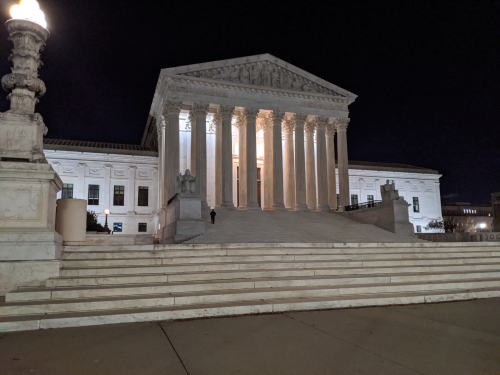We are noted for our ability to find takings and property issues nearly anywhere, and two cases argued today at the Supreme Court — where we had the pole position in the Bar line as the above photo proves — are no exception, even though the first was a case about a tax refund, and the second was about the Superfund statute.
The tax case was a bit of a stretch, we admit. But there was a brief colloquy about how a taxpayer has property rights to any refund. When we heard that, we sure perked up. There was more to glom onto in the second case on CERCLA (Superfund) where the issue is whether the federal statute allows property owners whose land is contaminated to sue the contaminator under state tort and property law to clean it up.
As we understand the issues, Atlantic Richfield is such a contaminator, and is or has remediated certain sites in Montana under an EPA-approved Superfund plan. Private property owners sued separately under Montana law for trespass and nuisance, seeking damages (which, under Montana law, must be used to remediate the property). While the Court didn’t seem too interested in any federal preemption question, many of the Justices actively questioned the three advocates about whether CERCLA leaves any room for state property and tort law to protect private property owners.
And here’s where we get to our takings gem of the day: Justice Gorsuch (who was followed up with a question from Justice Sotomayor), asked whether depriving property owners of their right to recovery under Montana law might be a taking. (We are paraphrasing, of course, but that was the drift of his question.) Although the advocate didn’t answer directly — indeed, as we see it, he didn’t answer this question at all — this perked our ears up, because we think it was getting to the point of whether this case presents one like Preseault v United States where the Court upheld the Rails-to-Trails Act against a Commerce Clause challenge, but also noted that preventing the operation of a state property law easement reversion might be a taking. As we takings nerds know, that has proven very true.
As we saw today’s thread, maybe Justice Gorsuch was getting at the idea that yes, the EPA’s remediation plan can be both a “floor and ceiling” (as many Justices characterized CERCLA), setting both minimum requirements for compliance, and prohibiting state action above-and-beyond. And thus, private property owners may be prohibited from exercising their state law remedies fully, and they cannot through a state court judgment require a polluter to do more than the EPA requires. But if that’s the case, maybe the EPA is on the hook for compensation for taking state law claims and remedies.
Check it out. The transcript will be available soon. Pacific Legal Foundation’s Jon Wood was also in the courtroom, and we’re sure he’ll have a more informed view of the environmental law aspects of the case. Stay tuned.
